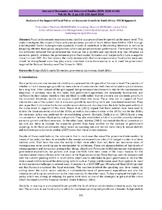| dc.contributor.author | Hlongwane, Tshembhani Mackson | |
| dc.contributor.author | Mongale, Itumeleng Pleasure | |
| dc.contributor.author | Tala, Lavisa | |
| dc.date.accessioned | 2021-03-19T09:25:18Z | |
| dc.date.available | 2021-03-19T09:25:18Z | |
| dc.date.issued | 2018 | |
| dc.identifier.citation | Hlongwane, T. M. et al. (2016). Analysis of the Impact of Fiscal policy on economic growth in South Africa: VECM approach. Journal of Economics and Behavioral Studies,10(2), 231-238 | en_US |
| dc.identifier.issn | 2220-6140 | |
| dc.identifier.uri | https://ojs.amhinternational.com/index.php/jebs/article/view/2232/1633 | |
| dc.identifier.uri | http://hdl.handle.net/10566/5992 | |
| dc.description.abstract | Fiscal policy ensures macroeconomic stability as a precondition for growth at the macro level. This study investigates the impact of fiscal policy on economic growth of South Africa from 1960 to 2014 through a Cointegrated Vector Autoregression approach. It seeks to contribute to the existing literature as well as in designing effective fiscal policy programmes which can propel economic performance. Theresults of the long run estimates revealed that government tax revenue has a positive and significant long run influence on economic growth, whereas the government gross fixed capital formation and budget deficit have a negative impact on real GDP. For that reason, the study recommends that some expansionary fiscal policy measures should be strengthened since they play a very important role in the economy so as to meet the government target of the National Development Plan Vision for 2030. | en_US |
| dc.language.iso | en | en_US |
| dc.subject | Budget deficit | en_US |
| dc.subject | Capital formation | en_US |
| dc.subject | Government | en_US |
| dc.subject | Tax revenue | en_US |
| dc.subject | South Africa | en_US |
| dc.title | Analysis of the Impact of Fiscal policy on economic growth in South Africa: VECM approach | en_US |
| dc.type | Article | en_US |

